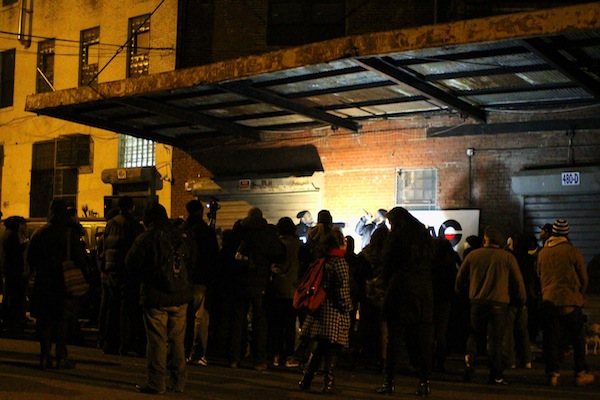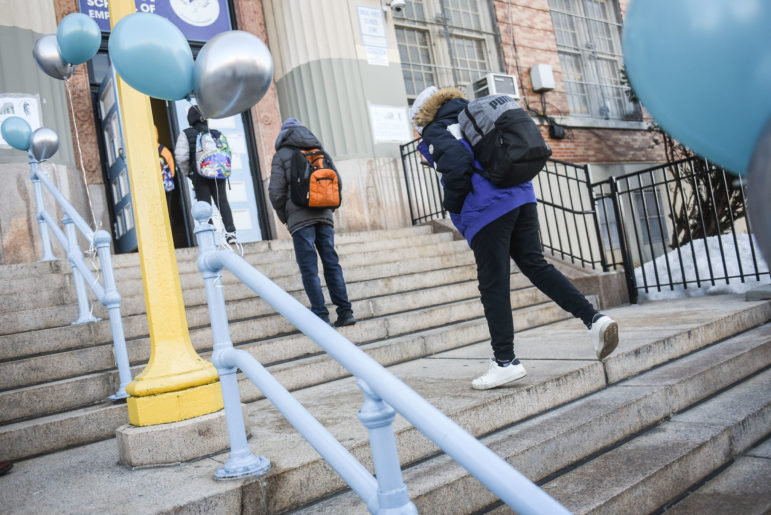
Photo by: Kathleen Caulderwood
Last week’s open mic by the Rebel Diaz Arts Collective.
On the first Friday of every month, the Rebel Diaz Arts Collective holds a hip-hop open mic night at their loft in the South Bronx. On March 1, the event went on as usual but for one small detail—it happened outside.
A few days earlier, the collective was evicted from the abandoned factory on Austin Place they had turned into a community centre. To its 25 members, the removal of the collective is an attack on the community, but the landlord says it’s a dispute over rent and vandalism. Now supporters are rallying to help the collective make future plans.
“It’s kind of a gift and a curse,” says John Mega, a member of the collective and host of the open mic night, “RDAC is about the people who made it what it is.”
The RDAC (pronounced r-dack) provided free media training and performance opportunities for youth in the Mott Haven and Hunts Point neighborhoods of the Bronx. It has helped people like Karen Louvriere. 19, who first joined the collective to learn about spoken word and photography and ended up joining an RDAC committee for public outreach.
“I went to our community board meeting for the first time and I liked that experience.” She started working in the neighborhood, talking to other kids about the space and helping with a youth employment program. Louvriere is studying liberal arts at the New School and now hopes to start her own grassroots community center.
Connections to Chavez
Every month, RDAC’s activities would draw 500 to 700 kids from the area, according to Rodrigo Venegas, a founding member of the collective. He’s half of the hip-hop duo Rebel Diaz, which consists of brothers Rodrigo and Gonzalo Venegas (known as RodStarz and G1, respectively). They have been performing around the US and internationally for the past seven years, combining music with social commentary.
Their latest release came out a little over a week after the eviction. “I can’t front I’m upset that they took our building/Next thing the Commandante man I know they killed him,” the song starts. “Time to step it up ’cause I still smell sulfur/Still smell the money in this capitalist culture.” The new track is entitled “Work Like Chavez,” an homage to the late Venezuelan President Hugo Chavez, who was nicknamed Commandante and once used a reference to sulfur to suggest President George W. Bush was demonic.
The song isn’t their only connection to Venezuela. According to Venegas, major funding for the collective’s programs came from Citgo, the Venezuelan-owned oil company. When Chavez visited the South Bronx in 2005, he started a fund to donate money to grassroots groups in the area, along with other charitable projects. Citgo continued the program, funding newer programs like RDAC over the past decade. Another Venezuelan-based group, the Simon Bolivar Foundation, also offers grants to South Bronx non-profits. With donations from these groups the collective created programs such as the Nuestra American Media Center, a media literacy project.
Before this funding came in, the collective had depended purely on donations from people in the community.
Venegas says the collective began when he and others from the area got together in 2008 to refurbish what was then an abandoned candy factory. “We had local carpenters, electricians and everyone from the community came together and donated work and time,” he says. They put up new drywall to create two recording studios, a performance space and a small conference room.
Dispute over rent and conduct
In November, Marc Pogostin, representing his father Joseph, the owner of the space, presented the group with a new lease at a higher rent: $2,400 a month instead of the $1,400 the group had been paying, according to Venegas.
“It was never signed, of course,” says Anusha Mehar, the collective member who handled the lease negotiations. She says the collective couldn’t afford to pay the new rent and also run their programs. “We would never agree to compromise the sustainability of our space,” she says, adding that the increase was not what they had agreed on in an earlier conversation with the landlord.
Money wasn’t the only point of contention between Pogostin and the collective. Graffiti was another.
“It’s true we painted several murals on the roof of the building,” says Mehar. She contends Pogostin blamed the collective for all the graffiti in the area—not just the murals on their roof.
“But we were always having strong dialogues with any of our youths or individuals who came through our doors about respecting our neighborhood,” she says, denying R-DAC members did other graffiti.
Marc Pogostin declined to comment. However, his brother Richard Pogostin, also a lawyer at the same firm as Marc and their father, Joseph, was happy to speak on the record.
“I know a lot about it,” he says. “They are typical deadbeat tenants and to make it worse they absolutely trash the neighborhood.”
He says that the collective had defaulted on their rent more than once during their lease, and owed upwards of $10,000.
“It was a completely legal eviction,” says Pogostin. “They didn’t pay their rent. We threw them out.”
‘Raid’ rallies supporters
Julio Calderon, who has been working with Rebel Diaz for a few years, was the only person in the building when the eviction happened, on Feb. 28th. He says he had fallen asleep in one of the studios and woke up to the sound of someone knocking at the door. “They told me to stay away from the door, and then it flung open,” he says.
A press release on the RDAC blog reported that the community center had been “shut down by Federal marshals and NYPD.”
“The violent actions taken yesterday are an attack on young people, artists, and Hip Hop culture,”said RodStarz in the March 1 press release. “In a time where budget cuts, stop and frisk, and gentrification are affecting our communities, it’s a shame we are being treated like criminals. There is no justification for this eviction.”
But according to Deputy Inspector Chris McCormack of the 40th Precinct, this eviction, like all evictions, was handled by New York City marshals only.
Regardless, news of a “violent daytime raid” has rallied RDAC members and supporters. Some allies have suggested the collective was evicted because of its political leanings.
Last week, the group launched an online campaign where supporters post videos on Facebook and label them with #IamRDAC. So far more then 30 people have posted since the first video on March 4.
RDAC is also looking to other community organizations for help.
Community Connections for Youth, a South Bronx nonprofit focused on keeping young people out of jail, is one of them.
“What’s tragic about it is that they were doing everything we say we want young people to do,” says Ruben Austria, the founder and director, who said he’s helping RDAC and other grassroots community projects find space to work and run their programs. “That’s the type of space that young people really need,” he adds.
Collective members say that the eviction is difficult but are making big plans for RDAC’s future.
“Our space is shut down,” says Mehar, “But we’re not shut up.”








